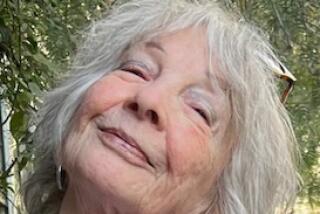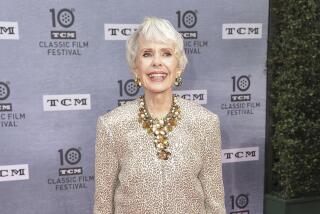Barbara G. Harrison, 67; Writer Known for Her Fierce Opinions
- Share via
Barbara Grizzuti Harrison, a journalist and essayist whose writing on topics as diverse as the Jehovah’s Witnesses and Spike Lee was distinguished by strong opinions and a willingness to cast herself into the action, died Wednesday in New York of chronic obstructive pulmonary disease. She was 67.
Harrison was the author of eight books, including a novel and two collections of articles and essays that originally appeared in such magazines as Ms., Esquire, Harper’s and the Nation.
Her nonfiction books included “Unlearning the Lie: Sexism in School” and “Visions of Glory: A History and a Memory of Jehovah’s Witnesses.”
The latter book, published in 1980, received wide notice as a compelling autobiography as well as for its profile of an often poorly understood religion.
Roman Catholic by birth, she converted to the Jehovah’s Witness faith at the age of 9 along with her mother. Harrison remained a member for 13 years, going so far as to live and work in the Watchtower Bible and Tract Society headquarters in Brooklyn Heights, N.Y., when she was 19. She renounced the faith three years later.
In the book, she wrote of the kindness Jehovah’s Witnesses showed to one another and the persecutions they suffered. She also portrayed the faith as racist, sexist and totalitarian.
Reviewers responded positively to the book. Vivian Gornick, writing in the New York Times Book Review, said “Visions of Glory” is “well written, contains a mass of absorbing information, and the personality of its author is extremely appealing.”
Many reviewers found it impossible to critique Harrison’s work without acknowledging her fierce opinions and strong personality, which enlivened her writing.
“To refuse to make essential discriminations, to abdicate the responsibility of judgment, is to lessen one’s being as a person,” she once wrote.
Thus in “Off Center: Essays,” published in 1980, she delivered a stunning dissection of Joan Didion, the highly regarded prose stylist. Harrison described her as a “neurasthenic Cher.”
Harrison grew up in a dysfunctional family in the Bensonhurst section of Brooklyn. Her father sexually abused her and tried to kill her. Her mother, volatile and deeply disturbed, dragged her off to join a religious sect that does not permit saluting the flag or receiving blood transfusions.
After leaving the Jehovah’s Witnesses, Harrison worked as a secretary, wed and began a family. She was married for eight years to W. Dale Harrison and lived with him in Libya, India and Guatemala when he was a worker with the relief agency CARE.
She was known as a gifted interviewer, whose subjects ranged from Phyllis Schlafly to Gore Vidal.
Asked what her secret was, she said the first step was exhaustively researching her subject. But “the trick beyond that,” she told Contemporary Authors, was to “pay absolute attention when you’re with that person. Usually when I interview, the person I’m interviewing is the most interesting person in the world to me at that moment. And that is not an act.”
Her other books include “An Accidental Autobiography” in 1996; “Italian Days” in 1989, which combined travelogue book and autobiographical musings and won the American Book Award; and a novel, “Foreign Bodies” in 1984.
Harrison is survived by a daughter and a son.
More to Read
Sign up for our Book Club newsletter
Get the latest news, events and more from the Los Angeles Times Book Club, and help us get L.A. reading and talking.
You may occasionally receive promotional content from the Los Angeles Times.









